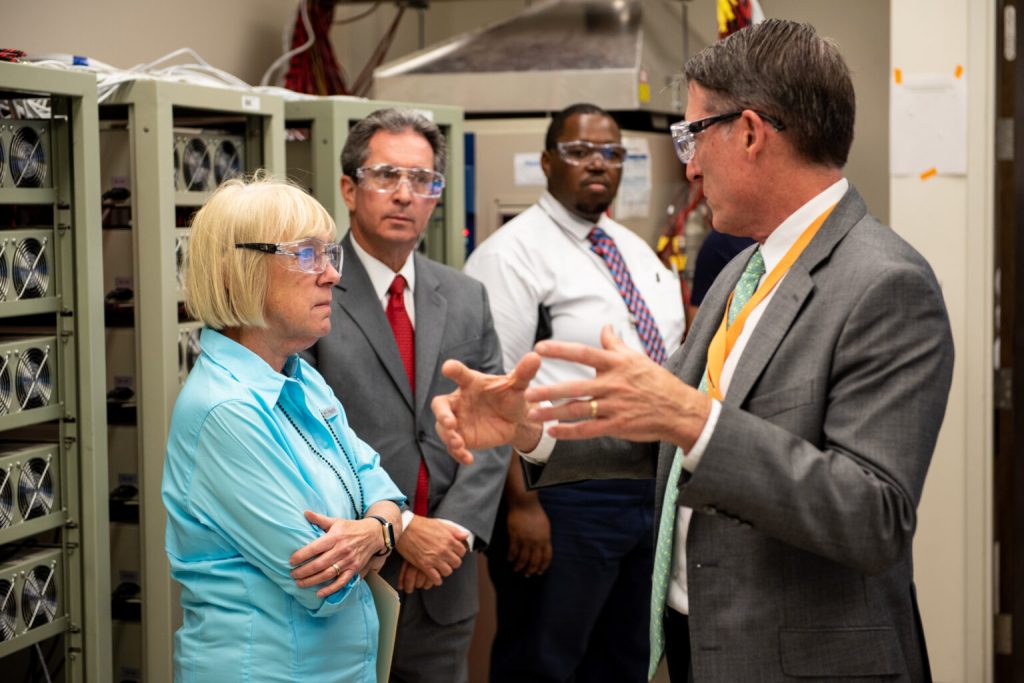Trump, Congressional Republicans propose big cuts for Western renewable energy labs, research
Published 6:22 am Monday, August 4, 2025

- Washington’s U.S Sen. Patty Murray visits the Pacific Northwest National Laboratory in 2019 to learn about battery research and other lab research. (Photo by Andrea Starr/ Pacific Northwest National Laboratory)
The Pacific Northwest National Laboratory would lose a third of its funding, and the National Renewable Energy Laboratory would lose more than half
National research laboratories in Colorado, Oregon and Washington focused on addressing climate change and its impacts and improving energy efficiency and affordability for Americans would be gutted under budgets proposed by President Donald Trump and Congressional Republicans.
The Pacific Northwest National Laboratory, based in Richland, Washington and Portland, Oregon, and the National Renewable Energy Laboratory, based in Golden, Colorado, would see their funding in the year ahead nearly halved under the Trump administration’s proposed 2026 budget for the U.S. Department of Energy. Lawmakers in both the House and Senate are negotiating spending bills for the next fiscal year that begins in October and will decide on the energy agency’s budget after Sept. 2, when they return from their August recess.
The national labs are meant to lead research and scientific experimentation in climate and clean energy strategies, including measuring extreme weather risks by collecting and analyzing atmospheric data from around the world and improving battery and grid technologies to get more wind and solar energy flowing to homes and businesses. They also study energy efficiency across U.S. infrastructure and commerce, all of which is meant to save Americans and businesses money and to curb climate-warming greenhouse gas emissions.
Trending
Andrea McMakin, a former communications specialist and 34-year veteran of the Northwest Laboratory in Richland, said the U.S. risks losing its best scientists if the proposed funding cuts go through.
McMakin is part of the group Friends of Pacific Northwest National Laboratory, which has been raising concerns about the cuts. McMakin said the group learned in June that the lab’s former director told staff in a meeting that up to 1,000 people could be cut if the current budget passes, a number that’s been echoed by state leaders.
“Those people leave. They have to find jobs someplace. And we’re seeing that a lot of other countries are stepping up their recruiting to get U.S. scientists and engineers,” McMakin said. “We don’t want to see that. We want to keep our energy competitiveness and we want to keep our brain power here in the U.S.”
A recent report from Politico cites two sources familiar with U.S. Department of Energy facilities who said up to 1,000 people could be cut from the National Renewable Energy Laboratory in Colorado.
Heather Lammers, a spokesperson for the National Renewable Energy Laboratory, said in an email that the lab is talking with the federal energy department to fully understand the impacts of its proposed spending cuts.
The Northwest Laboratory’s public affairs officer, Dawn Zimmerman, did not confirm figures for potential staff cuts and said the U.S. Department of Energy requires all queries involving the federal budget to be directed to its public affairs office. An unnamed energy department spokesperson said in an email that personnel decisions are dictated by the labs directly, not the federal government.
Trending
“The Department of Energy is committed to making the American people’s government more efficient while also growing the output of top-quality science at our national labs,” the spokesperson wrote.
Proposed cuts
Trump proposed in May cutting next year’s budget for the U.S. energy department by about $3.5 billion. Of that, $2.5 billion would be cut from the agency’s Office of Energy Efficiency and Renewable Energy — a 74% reduction from its current budget.
The Energy Efficiency and Renewable Energy office, established following the 1973 oil crisis, in recent years has focused on researching, developing and deploying technologies meant to reduce greenhouse gas emissions from the country’s electricity sector. That technology includes batteries that can hold large amounts of wind and solar power, and white LED light bulbs that require far less energy than incandescent and fluorescent lights.
The budget also cuts 14%, or $1.15 billion, from the department’s Biological and Environmental Research program, meant to collect and analyze climate change data.
Both the Colorado lab and the Pacific Northwest National Laboratory get most of their funding from those two programs. But under Trump’s proposed 2026 budget, the Renewable Energy Lab would lose $387 million in funding – more than half of its current budget.
Lammers, the spokesperson for the National Renewable Energy Lab, said it also receives funding from state and tribal governments and some private industry partners.
“We remain committed to our mission of delivering integrated solutions for an affordable, secure and reliable energy future through research, innovation and strategic collaboration,” she said.
The Northwest National Lab would lose about $280 million, a third of its current budget.
The lab, which employs more than 5,000 people, is the largest employer in Washington’s Tri-Cities area, which includes Kennewick, Pasco, and Richland, according to the area’s development council.
State lawmakers weigh in
Washington’s U.S. Sen. Patty Murray, a Democrat, said the Republican budget for the energy department would be a “devastating blow” to the Northwest National Lab.
“Make no mistake: if Trump’s budget request were to become law, it would result in the loss of over 1,000 jobs at PNNL. On top of that, this administration is defying the law right now by redirecting millions of dollars away from wind and solar research and development happening at our national labs — this move alone could force major layoffs at PNNL,” she said in a statement.
Murray, the lead Democrat and vice chair on the Senate Appropriations Committee, said she would fight the proposed cuts.
“President Trump’s budget is dead on arrival in the Senate as far as I’m concerned,” she said. “I’m working to write a bipartisan funding bill that will protect investments in our national labs and save the jobs President Trump is thoughtlessly seeking to eliminate.”
Oregon’s U.S. Sen. Ron Wyden, also a Democrat, said in an email the Republican budget is “anti-science” and will harm clean energy industries gaining traction and growing in parts of the state.
“I just had five town halls in eastern Oregon where wind turbines and solar panels are taking full advantage of renewable energy options that lower prices for consumers and fight the climate crisis,” Wyden said. “That’s but one clear example of how this latest Republican scheme to slash research investments in clean energy would be both nonsense and anti-science.”
Wyden said he voted against confirming oil executive Audrey Robertson as Trump’s appointee for assistant secretary for energy efficiency and renewable energy at the federal energy agency, in large part because Trump said he wanted to cut renewable energy investments.
Trump threatened nearly identical cuts for the energy department during his first presidency in 2017, but Congress ultimately ignored the president’s suggested budget for the agency. McMakin said she remembers staff of the Northwest National Lab starting to change the way they talked about their work so they wouldn’t draw Trump’s attention.
“I remember at that time it was like, we have to change. We can’t say ‘atmospheric climate science’ anymore, we have to say ‘earth sciences,’ because it was just one of those language things that if you said climate science or anything about climate you are in danger of getting your funding cut,” she said.








